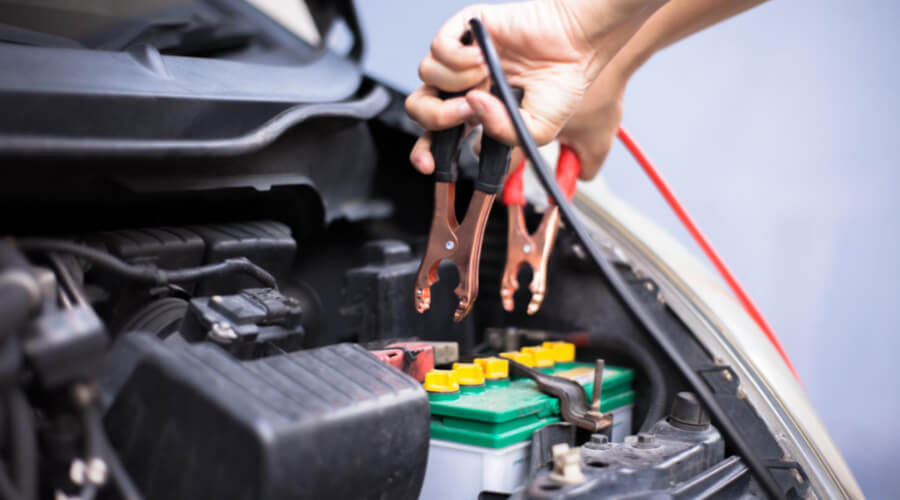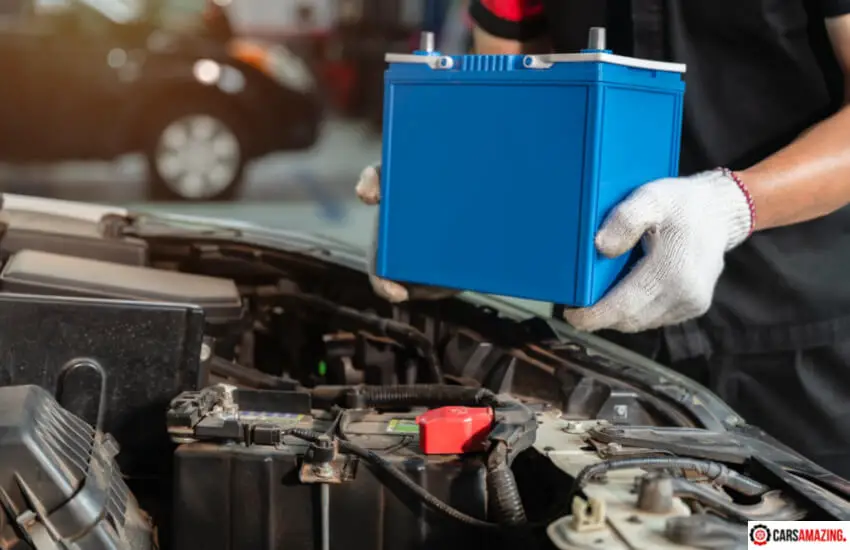Last Updated on December 24, 2022 by Leepu Da Maxim
Like most other hybrid vehicles, the Toyota Prius has two batteries: a small 12-volt auxiliary battery that powers electrical components such as the lights, windows, and entertainment system and a larger 200V high-voltage hybrid battery that starts running the vehicle. The Toyota Prius has a high-voltage nickel-metal hydride (NiMH) battery that provides power to the electric motor.
Key Takeaways
- The two batteries of the Toyota Prius make this car a hybrid car and not fully electric or a standard gas engine car
- The battery pack of the Toyota Prius hybrid electric vehicle locates under the rear seat and consists of 28 individual battery cells
- Toyota Prius has two different types of batteries: a 12-volt lead-acid battery and an electric battery
- The second generation of the Toyota Prius features a nickel-metal hydride battery pack with 28 Panasonic modules where each module has six 1.2V cells
Why Does The Prius Have Two Batteries?
The Toyota Prius has two batteries because it is a hybrid vehicle; hybrid vehicles have two batteries. One battery is a 12-volt lead-acid battery, and the other is the electric battery which is the primary battery in a hybrid car. Let’s look at the functions of each battery in the Toyota Prius.
12-Volt Lead-Acid Battery
In a Toyota Prius, the 12V battery is the auxiliary battery, and its purpose is to power the vehicle’s accessories and computer when the hybrid system isn’t in ready mode. This battery also assists in starting the car, although the hybrid battery does the heavy work of starting the engine.
The 12V also reduces unnecessary drain of the hybrid battery by supplying power to other car components such as audio systems, headlights, accessory systems, and computer controls.
This battery also plays a significant role in preventing high voltage surges and offering a few safety features. For example, when your Prius isn’t in ready mode, the 12V battery makes it possible to disconnect the high-voltage hybrid battery from the rest of the system, and in case of an accident, there will be meager chances of high voltage going where it shouldn’t.
The 12V battery on a Toyota Prius is located in the trunk beneath the plastic storage cover on the right side.
The High-Voltage Hybrid Battery
The larger hybrid battery powers the hybrid system: it is responsible for starting the car and powering the electric motors in your car to make it run. This battery makes the Prius have better fuel economy because it runs the electric motor putting less pressure on the gasoline engine, thus stretching out the quantity of fuel the vehicle burns before the next refill.
The hybrid battery in a Toyota Prius is located behind the back seat in the trunk. It can either be made of lithium-ion (Li-ion) or nickel-metal hydride (NiMH). The Nickel-metal hydride (NiMH) battery has been around for decades and is found in most hybrid vehicles on the road. These batteries can withstand harsher temperature changes and are ideal for climates where chilly temperatures, ice, and snow are prevalent. They are also long-lasting and dependable.
The second generation of Toyota Prius features a nickel-metal hydride battery pack with 28 Panasonic modules; each module has six 1.2V cells. The battery produces 201.6 volts and is located behind the back seat. The battery discharges 20kW power at 50% charge. The Prius has a dedicated computer to keep the battery at optimum charge level and temperature. It features a 12-volt blower and a rear tire that supplies cool air to the battery as required.
The lithium-ion battery is the newest technology in hybrid batteries, and it’s smaller and lighter than the Nickel-metal hydride battery. Both batteries can hold the same amount of power but the lithium-ion battery charges and discharge faster. Since the li-ion battery is lighter, it is advantageous because it aids the Toyota Prius in going quicker and easier.
The main disadvantage of the Lithium-ion battery is that it doesn’t last as long as the Nickel-metal hydride in extremely high temperatures. This battery is also relatively more expensive, but this may change as its popularity keeps growing. However, both batteries are dependable and will last a long time; even if they don’t, the Toyota extended hybrid battery warranty covers them for 150,000 miles or ten years.
How Do Hybrid Batteries Work?

Now that you know your Prius has two batteries, you must be curious about how they work together, how the electric battery is recharged, and such. Let’s find out together.
Hybrid vehicles combine electric battery technology and gasoline by utilizing the 12-volt lead-acid battery and a hybrid battery. The 12-volt lead-acid battery powers electrical components and starts the car when it is not ready. A hybrid vehicle primarily relies on the electric battery and is gas-powered, thus achieving better fuel economy and fewer emissions.
Hybrid batteries have two electrodes that sit in an electrolyte solution. A polymer film separates these electrodes to prevent short-circuiting. When the vehicle is turned on, the electrodes are bridged, and the cells work together to create a massive charge used to power the car. The energy produced by the hybrid battery will determine the vehicle’s electric range capability.
The hybrid battery recharges as you drive through a process known as regenerative braking. When the driver presses the brake pedal, energy is produced and channeled toward recharging the electric battery. The vehicle seamlessly switches between the electric battery and gasoline engine, giving hybrid vehicles outstanding fuel efficiency.
Frequently Asked Questions
1. What Happens When The Prius Battery Dies?
If the hybrid battery dies, your car won’t start, and you cannot drive until the battery is repaired or replaced. Your hybrid vehicle will give you several warnings before the battery dies and the car refuses to turn on. Some signs of a dying hybrid battery include reduced miles per gallon, strange engine noises, and the internal combustion engine kicking in. Hybrid batteries last about 8 to 10 years and can die any time after that.
2. How Much Does It Cost To Replace A Hybrid Battery?
The average cost of a New Prius hybrid battery is between $2400-$2700, depending on where you buy it. The cost of labor can increase battery replacement cost to $4500 -$5000. You will need a professional who has the right experience and expertise in dealing with battery replacement since there’s high voltage involved. It would help if you also had the proper diagnostic equipment to avoid further problems.
3. How Often Does A Prius Battery Need To Be Replaced?
Toyota says that a Prius battery lasts between 8-10 years or 100,000-150,000 miles. You can expect your battery to last this long without needing to be replaced. They even have a hybrid battery warranty that caters to the cost of replacement if you need to change your battery before this time. Most drivers have reported going over the warranty and not experiencing any issues with their hybrid battery.
4. How Much Is A 12V Prius Battery?
The costs of a 12V Prius battery costs between $200-$350 depending on where you buy. Local auto parts stores are way cheaper than Toyota dealers. Buy from auto shops if you are looking to save some money.
5. Can You Jump-Start A Prius?
Yes, if your Prius 12V battery is low on charge, you can jump-start it the same way you would a gas-powered vehicle. Although the battery is located in the trunk, the Prius has jump-starting terminals beneath the hood to make the process seamless for you.
Final Word
The Toyota Prius is a hybrid vehicle that features two batteries: the 12V auxiliary battery and the hybrid battery. The additional battery powers the electrical components, while the hybrid battery is responsible for the vehicle’s running. The car needs both batteries in order to run in an optimum state.
Reference:
https://www.quora.com/How-many-batteries-are-in-a-Prius
https://www.caranddriver.com/research/a31274277/prius-battery-life/

Hi, I’m Leepu Da Maxim , a dedicated car enthusiast with over 10 years of experience in this field, and I’m thrilled to share my passion and expertise with fellow car enthusiasts like you. My journey began in my hometown West Jordan, Utah, where my fascination with the mechanics and design of cars sparked at a young age. Over the years, this passion has evolved into a commitment to providing accurate, insightful, and engaging information about all things automotive through CarsAmazing .

